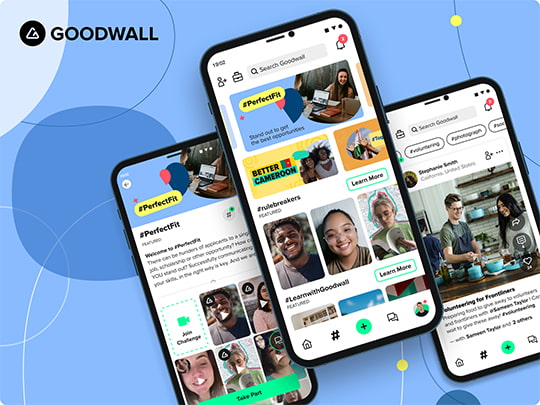It’s not easy to keep things on an even keel.
If it were, we’d all be working as hard as possible, truly relaxing after work, and appreciating everyone around us in the way they deserve to be appreciated. Sound like your life?
If not, don’t get too down on yourself. It’s tricky to find the right balance. When you do, new things will emerge and require attention that sends you back out of whack.
It’s a process that takes time and effort.
Getting ahold of the perfect work-life balance is an art, and we’re here to help you get better at it. Let’s take a look at what work-life balance is, how balancing life with work may benefit you, and what you can do to improve.

Want to showcase yourself in the best way possible to future employers and hiring managers?
Sign up to Goodwall!
- Develop skills & experience
- Highlight accomplishments
- Network globally
- Find top jobs & internships
Download the app now to get started for FREE!
What is a Work-Life Balance?
The idea of a work-life balance might be a new one to some people.
We’re often given a set of priorities and values but never stop to wonder whether or not they’re doing us any good. For example, the pressure to succeed at work is one that plagues a lot of people.
It’s instilled in us from an early age, and the better part of our lives are lead trying to reach a certain measure of success. Prioritizing work might dishevel your relationships, lower your self-esteem, and prevent you from enjoying the finer things. For some reason, though, we keep at it and don’t think twice.
The same goes for students. Studying and attending class could take up all of your time if you aren’t careful. Don’t get us wrong, there’s nothing wrong with achieving success.
Success requires hard work and dedication, and putting your energy toward something is a respectable thing to do.
When you take a look back on your relationships and personal experience, though, has work left a negative imprint on those areas of your life? Is it important for you to enjoy your life beyond work and school?
A healthy work-life balance allows you to have the energy to work on your career while taking care of your personal life in a way that contributes to your happiness. So what does that look like?
You’re making time for friends and making it to work on time the next morning. You’re feeling alert throughout the day at your job and still have the energy to talk with your daughter about her day. Your family doesn’t wonder if you’re upset with them because you haven’t reached out.
Your boss isn’t wondering if you might not be better suited for a different profession. Generally speaking, things are in check.
Related Read: 51+ Work-Life Balance Quotes to Know for Happiness & Success
How to Strike a Good Balance
Now, achieving a better work life balance is easier said than done. Things happen, we forget to prioritize, and sometimes there’s a pressing issue in an area of your life that requires more attention.
The important thing to remember is that balancing life with work isn’t about being perfect. It’s about applying an effort to keep things in check. In the end, that’s all that you can do.
Life throws things your way, and you have to respond. That said, let’s explore some methods that you can try your best to implement at all times.
1. Keep a Schedule
It sounds like a no-brainer, but keeping a schedule is something that many people fail to do. When you write out your schedule in advance, you can have a better view of how you’re distributing your time.
You can see that you’re spending “x” amount of time at work and not enough time with your family, for example. Planning in advance also allows you to incorporate special events like seeing old friends or going to concerts.
If you’re not keeping track of how you spend your time, it’s easy to put your head down and roll through three or four dismal weeks. A schedule can keep you on top of the energy you’re going to need for certain things as well.
When you have to do something on a schedule, you’ll plan for it in advance. Let’s say you’re trying to incorporate an hour-and-a-half to spend with your daughter after work.
If that date isn’t in your schedule, you might be more inclined to say you’re tired and that you’ll do it the next day. On the other hand, seeing that date on the schedule might motivate you to eat a healthier lunch or grab a coffee so you’ll have the energy to spend time with family.
Related Read: 10 Important Skills Employers Look For & Will Want In 2022 & Beyond
2. Factor in Personal Time
Failing to spend time on yourself is a big problem for many people. When responsibilities are pressing, the last thing we do is make time to enjoy ourselves and do what we like.
Taking time to recharge and enjoy yourself is essential. It gives you the energy and motivation to get back out and do a great job in other areas of your life.
This is a period of time when you aren’t responsible for anything else. Taking care of bills or organizing paperwork doesn’t count as personal time.
It could mean sitting down to watch some television or taking up a hobby. Reading a book, going for a walk, or simply taking a much-needed nap can all work. The point is that you’re doing something for yourself, and you’re making a conscious effort not to engage with other problems.
Your time could be spent with your partner or children as well, so long as it’s something that relaxes and recharges you.
3. Fuel Yourself for Your Life
Nobody likes to change a habit, but sometimes we have to change when our bad ones prevent us from living a good life.
Food and exercise are huge pieces of that puzzle. Many of us don’t get any exercise, and we eat whatever is in front of us. If your work-life balance needs an overhaul, it would be wise to think about getting some more nutritious food into that cabinet.
When you plan healthy meals, you’ll have more energy to do everything in your day. When you’re malnourished, you’ll be tired, avoidant, and stressed.
Incorporating some light exercise into your lifestyle will boost that energy up as well. As we all know, exercise gives endorphins and energy. That means you’ll be feeling energized and happier than you would otherwise be.
Further, we have to be mindful of the quality of sleep that we get. An inconsistent sleep schedule can cause a person to be tired, irritable, even depressed in some cases.
Related Read:
4. Set Personal Boundaries
If you have any hope of achieving work-life balance, you have to learn how to say no to certain things. Many of us are too used to saying yes to everything in an effort to make everyone happy.
When you stretch yourself too thin, you can’t deal with the responsibilities that you already have. It’s totally reasonable to hit your limit and say no to things. That’s true even if your reason for doing so is to take some time for yourself.
If a friend is looking to spend time with you more than your schedule allows, you can tell them that you’re balancing social life and work and you’re all booked up. When your boss asks you to take on an additional project, politely say that your schedule is already full if you can.
When your job doesn’t allow you to refuse excessive work, it might be time to start scouting out other options. We don’t all have the luxury to leave our job because it’s too taxing. That said, weigh the pros and cons of your position vs another, less demanding one if it’s an option for you.
It’s not rude to establish boundaries. It may feel impolite if you’re not used to saying no, but the fact is that you’ll be a healthier and happier person if you set those limits.
5. Check-in With Yourself Regularly
Do your best to establish a good work-life balance. You might find that the first few days prioritizing your professional and personal lives are easy. Small shifts can lead to big changes in your day-to-day experience.
You’ll also find that it’s easy to slip back into your old ways. Building habits and changing lifestyles are not easy things to do.
So, check-in with yourself every week or so to see how you’re holding up. If sweeping changes aren’t your thing, consider making small course corrections that will send you in the right direction.
For example, just make a schedule for the first week. Don’t change anything else other than abiding by your schedule. The next week, start incorporating changes to your diet.
Add little things each week so that the task of balancing life and work doesn’t seem so monumental. Over the course of a few months, you’ll see that a lot has changed.
You might even notice that your relationships and performance at work are improving. Keep checking in with yourself and making small changes so that things keep improving.
Need Some Help Getting Things in Order?
Figuring out how to balance personal life and a career can be a tricky thing to do. Whether you’re struggling with your work-life balance or you have questions about establishing good relationships, we’re here to help.
Explore our site for more insight into ways you can improve yourself, supercharge your career, level up your education, and a whole lot more. And, as always, if you have any questions, just leave ’em down below. Thanks for reading!
Related Read: How to Stop Overthinking: 10 Ways to Reduce Worry & Negative Thoughts



